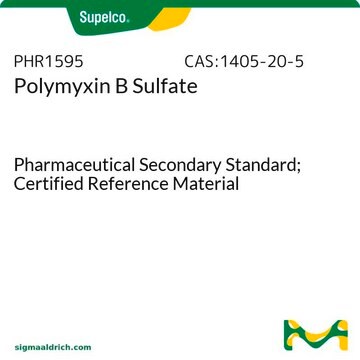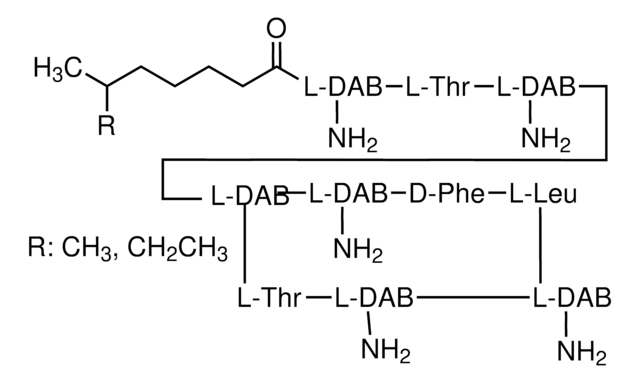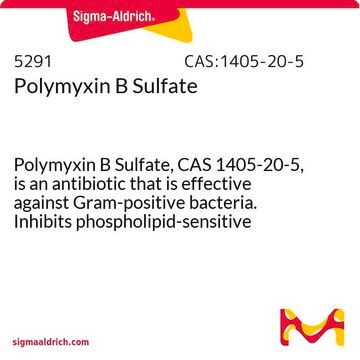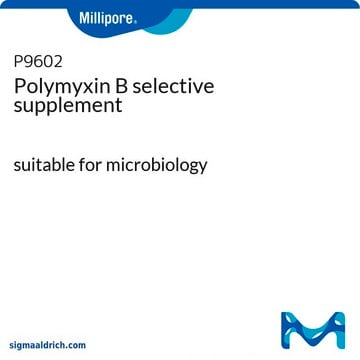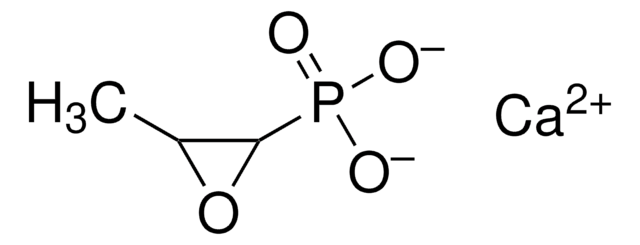P2400000
Polymyxin B sulfate
European Pharmacopoeia (EP) Reference Standard
About This Item
Recommended Products
grade
pharmaceutical primary standard
API family
polymyxin
manufacturer/tradename
EDQM
application(s)
pharmaceutical (small molecule)
format
neat
SMILES string
[S](=O)(=O)(O)O.N1CCC(C(=O)NC(C(=O)NC(C(=O)NC(C(=O)NC(C(=O)NC(C(=O)NC(C1=O)CCO)CCN)CCN)CC(C)C)Cc2ccccc2)CCN)NC(=O)C(NC(=O)C(NC(=O)C(NC=O)CCN)CCO)CCN
InChI
1S/C48H82N16O13.H2O4S/c1-27(2)24-37-47(76)59-32(11-19-52)41(70)56-31(10-18-51)43(72)61-35(14-22-65)39(68)54-21-13-34(45(74)57-33(12-20-53)44(73)64-38(48(77)63-37)25-28-6-4-3-5-7-28)60-42(71)30(9-17-50)58-46(75)36(15-23-66)62-40(69)29(8-16-49)55-26-67;1-5(2,3)4/h3-7,26-27,29-38,65-66H,8-25,49-53H2,1-2H3,(H,54,68)(H,55,67)(H,56,70)(H,57,74)(H,58,75)(H,59,76)(H,60,71)(H,61,72)(H,62,69)(H,63,77)(H,64,73);(H2,1,2,3,4)
InChI key
HNDFYNOVSOOGDU-UHFFFAOYSA-N
Looking for similar products? Visit Product Comparison Guide
General description
Application
Packaging
Other Notes
Signal Word
Warning
Hazard Statements
Precautionary Statements
Hazard Classifications
Acute Tox. 4 Oral
Storage Class Code
11 - Combustible Solids
WGK
WGK 3
Flash Point(F)
Not applicable
Flash Point(C)
Not applicable
Regulatory Listings
Regulatory Listings are mainly provided for chemical products. Only limited information can be provided here for non-chemical products. No entry means none of the components are listed. It is the user’s obligation to ensure the safe and legal use of the product.
JAN Code
P2400000-1EA:
P2400000:
P2400000-25MG:
Choose from one of the most recent versions:
Certificates of Analysis (COA)
Sorry, we don't have COAs for this product available online at this time.
If you need assistance, please contact Customer Support.
Already Own This Product?
Find documentation for the products that you have recently purchased in the Document Library.
Customers Also Viewed
Our team of scientists has experience in all areas of research including Life Science, Material Science, Chemical Synthesis, Chromatography, Analytical and many others.
Contact Technical Service
